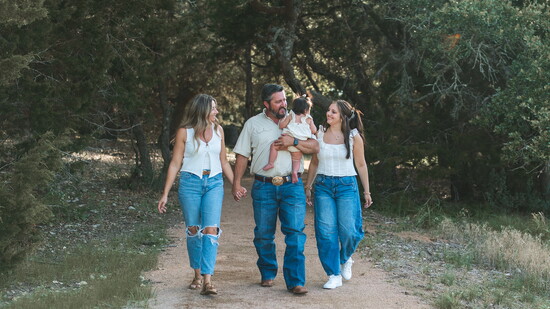It was born out of a simple but urgent conviction: more could be done—and more should be done—to care for children in the foster system. What started a decade ago with two employees and a vision to equip churches and the community has grown into a movement transforming lives across South Texas.
Now celebrating its tenth anniversary, 1HOPE for Kids has placed over 1,100 children in safe homes, supported more than 530 reunifications, and celebrated more than 375 adoptions.
“Foster care is a community problem,” President and CEO John Wilhelm says. “And we’re giving the community the tools to take responsibility for their own children in need.” When local people are empowered with the right tools, support, and vision, he believes they can become the solution.
Then: A Calling, a Crisis, and a Community Response
For Wilhelm, the heart for children in crisis began decades earlier behind the Iron Curtain. In the late 1980s, Wilhelm was a missionary smuggling Bibles into the Soviet Union. He remembers encountering the staggering needs of children living in orphanages, which planted the seeds of a lifelong calling.
Back in the U.S., Wilhelm spent years as a pastor before feeling called to serve again, this time in his own community. Thanks to the groundwork he laid in 2014, 1HOPE placed its first child in foster care in August 2015. What began as a two-person operation with Wilhelm and Kristi Parker, now the agency’s executive director and COO, quickly grew. The explosive growth 1HOPE experienced in its early years made it clear that many were eager to help. They just needed a clear way to get involved.
1HOPE was designed to operate through church partnerships from the beginning, equipping congregations to support foster families and offer critical “wraparound care.” This includes everything from diapers to babysitting, prayer, and encouragement. It’s a model that reflects 1HOPE’s core belief: fostering is a community mission, not an individual one.
Now: Stability, Support, and Impact
Today, that vision is bearing fruit across South Texas. More than 425 homes have been licensed through 1HOPE, and the community support remains central to its success. Jennifer House, a foster parent with 1HOPE, knows the difference this support makes. “We wanted to foster for 16 years, but it always seemed too complicated,” she says. “1HOPE made it possible. They handle the hard parts, walk with you through the rest, and genuinely care—about our foster kids, our biological kids, and us.”
House currently cares for two foster children, and says she couldn’t imagine doing this without the agency. Her caseworker checks in regularly and shows up with authentic care. She says it’s clear that this work is more than a job for them; it’s a calling.
That matters because, in Texas, the average foster parent quits after just one year. Between burnout, limited resources, and emotional strain, many feel overwhelmed. But at 1HOPE, foster families stay significantly longer—2.5 years, on average—with many fostering for over seven years. The difference? The support. Through church-based volunteer teams and dedicated caseworkers, 1HOPE builds the kind of lasting community families need to sustain the challenges of foster care.
Chelsea Aguilar, who was licensed in 2022 and received her first placement in 2023, recalls being immediately surrounded by practical and emotional care, from a crib and essential baby gear to handwritten notes and diapers. People often tell her, “I could never do what you do,” referring to the emotional risk of forming bonds that may not last. But for Chelsea, that very connection is the point. “Yes, it’s hard,” she says, “but that connection is exactly what these children need.”
Next: Expanding Care for Teens and Mental Health
As 1HOPE enters its second decade, it’s tackling some of the toughest challenges in the foster care system, starting with teenagers. The group plans to launch its first family-style teen homes: ordinary houses in ordinary neighborhoods, devoted exclusively to fostering youth aged 12–17.
Unlike traditional group homes, these houses will feel like real family environments, with single parents or couples who commit to long-term care. Each home will receive an unprecedented level of support, including a full-time assistant, the ability for one parent to stay home, and double the wraparound care. It’s a bold new effort based on a proven model in Florida, and it took nearly eight years to receive state approval.
Alongside this initiative, 1HOPE is also developing its own in-house mental health department. Rather than outsourcing therapy, the organization will hire trauma-informed therapists, and potentially psychologists and psychiatrists, dedicated to serving children and families within the 1HOPE system. With both of these expansions, the goal remains the same: to equip communities to care for their own children with excellence, compassion, and faith.
From a Soviet orphanage in the 1980s to family homes across Texas today, Wilhelm’s mission to serve vulnerable children has come full circle. What began as a personal calling has grown into a thriving, faith-fueled community movement. “Foster care isn’t a state problem; it’s a people problem,” Wilhelm says. “And it’s the church’s opportunity, the community’s opportunity, to step in and take responsibility for the most vulnerable among us.”
There are lots of ways to get involved and support 1HOPE for Kids. Two significant ways are their 10th Anniversary Luncheon on August 19th, and their inaugural golf tournament on September 29th. See our “Events” section and visit the 1HOPE website for more information.
1hopeforkids.org | 11550 I-10, Ste. 255, San Antonio | 210-910-6533
“Foster care is a community problem. And we’re giving the community the tools to take responsibility for their own children in need.” —John Wilhelm
